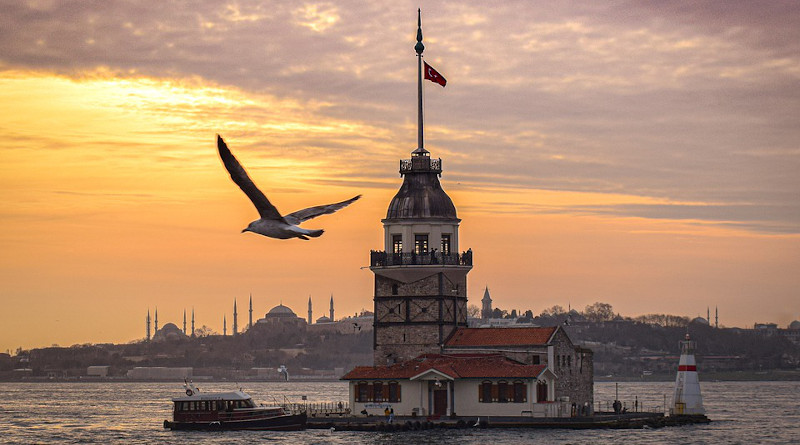Israeli Tourists In Turkey Warned Of Attack Threat From Iran
By Arab News
By Menekse Tokyay
Israeli tourists in Istanbul have been urged to return home “as soon as possible” amid heightened fears of attacks on holidaymakers by Iranian agents.
Turkish and Israeli security chiefs have recently been successful in collaborating over the threat of Israeli citizens in Turkey being the target of Iran-backed kidnappings or killings.
But Israel’s Foreign Affairs Minister Yair Lapid has now warned that Tehran may be plotting revenge attacks on pleasure trippers.
Addressing a meeting of lawmakers from his Yesh Atid party, he said: “It’s a real and immediate danger.
“If you are already in Istanbul, return to Israel as soon as possible. If you have planned a flight to Istanbul, cancel. No vacation is worth your life.”
Lapid added that all non-essential trips to Turkey should be avoided.
Israel recently alerted Ankara about a potential Iranian plan to abduct and kill Israelis in Turkey.
Last month, Israeli and Turkish security agencies uncovered an Iranian conspiracy to kidnap Israeli tourists in Turkey and foiled an attack at the last moment, according to Israeli media.
In February, the Turkish national intelligence agency, in cooperation with its Israeli counterpart, thwarted another Iranian cell planning to assassinate 75-year-old Turkish-Israeli businessman Yair Geller, in Istanbul.
Jason Brodsky, policy director of United Against Nuclear Iran, told Arab News that Lapid’s warning reflected a concrete and imminent threat to Israelis in Turkey.
He said: “This is an unusual step for Israel’s Foreign Ministry to take, and it reflects the seriousness of the situation. Iran is trying to restore the deterrence equation by expanding its target list, focusing on not just Israeli diplomats and businessmen, but now civilian tourists.
“This likely reflects frustration on the part of Iranian security services after repeated attacks and setbacks. Iran and its proxies have targeted Israeli tourists before, for example in July 2012 when Israeli tourists were killed in the Burgas bus bombing in Bulgaria. So, it would not be unprecedented for Tehran to take this step,” he added.
Iranian networks are still believed to be operating inside Turkey in a bid to carry out attacks and kidnappings.
Iran recently accused Israel of assassinating Islamic Revolutionary Guard Corps Col. Sayyad Khodaei, who was shot dead in the middle of Tehran on May 22. He was believed to be involved in attempts against Israelis.
Turkey is a popular tourist destination for Israelis. The improvement in the political climate between Turkey and Israel after years of crisis over an Israeli raid on a Gaza-bound Turkish flotilla, has resulted in an increased number of Istanbul bookings by Israeli travelers.
In March 2016, a suicide bomber blew himself up near an Israeli tourist group in the heart of Istanbul on a pedestrian boulevard, killing three of them.
Last year, the number of Israeli tourists visiting Turkey rose by 57 percent and passed beyond 200,000.
Gallia Lindenstrauss, a senior research fellow at the Institute for National Security Studies in Israel, told Arab News: “Obviously Iran is looking for opportunities to revenge attacks it believes Israel is behind. Turkey is an ideal location to target Israelis as it is a very popular tourist destination for Israelis.”
She pointed out that Tehran may intend to damage the current rapprochement between Israel and Turkey.
“Israeli and Turkish security services have a long history of cooperation and in fact almost in all the years of crisis between the two countries some level of intelligence cooperation remained and hence this basis of cooperation is now used well to thwart Iranian plans,” Lindenstrauss said.
Dr. Nimrod Goren, president and founder of Mitvim, the Israeli Institute for Regional Foreign Policies, told Arab News that tensions between Israel and Iran were on the rise, and as in the past they were being played out in various countries and regions.
He said: “Apparently, Iran is planning to attack Israelis visiting Turkey, and as this threat becomes more realistic, Israel is stepping up its warning to its citizens.”
Goren noted that the warming of bilateral ties between Turkey and Israel over the last year and the rebuilding of trust, dialogue channels, and practical cooperation had enabled the two countries to tackle the threat together with mutual sensitivity and consideration, eventually leveraging it for an improvement in ties.
“The Israeli travel warning to Turkey does not reflect any negative attitudes toward Turkey. On the contrary, Lapid thanked Turkey for its effort to secure Israelis, and the Israeli government expressed interest around Turkish Foreign Minister Mevlut Cavusoglu’s visit in deepening cooperation on tourism and civic aviation,” he added.
Iranian threats also coincide with the unprecedented efforts by both Turkey and Israel to search for potential bilateral cooperation avenues including on trade, energy, and tourism especially after Israeli president Isaac Herzog made a landmark visit to Ankara in March.
Cavusoglu met with Israeli’s Tourism Minister Yoel Razvozov and Regional Cooperation Minister Esawi Frej in Jerusalem on May 25 – the first such visit by a senior Turkish official in 15 years.
The ministers agreed to expand direct flights between the two countries as well as develop economic ties. Officials also committed to work on a new civil aviation agreement.
The latest security threat, Goren said, emphasized the need for Israel and Turkey to resume their strategic dialogue on regional affairs, which would be easier to do once full ambassadorial ties were restored, as both nations had successfully cooperated in the past in confronting terror threats.

